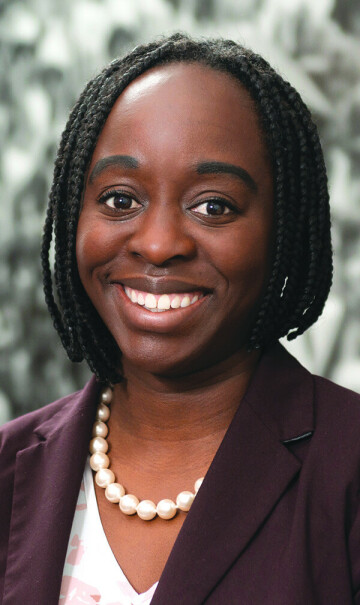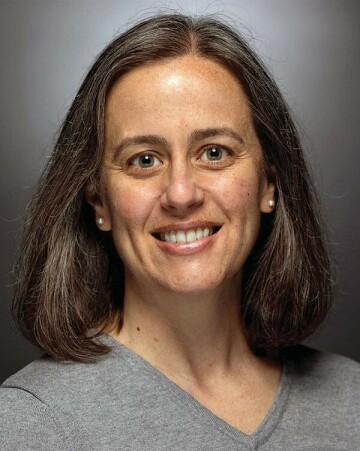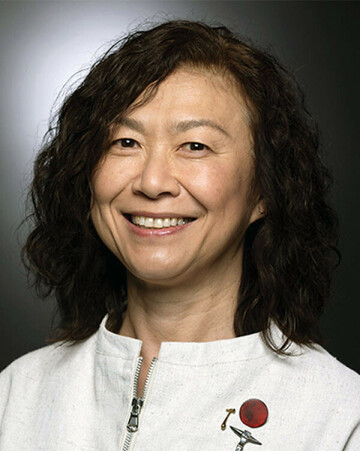LEADING LIGHTS: UW System Honors UWEC, UW-Stout Professors
meet three outstanding Chippewa Valley women in education
The Chippewa Valley is fortunate to have many people who labor day in and day out to improve the equality of our institutions, our community, and our world. Here are three who were recently honored for their work at UW System institutions in the region.
DR. STACEY JACKSON

Dr. Stacey Jackson, an assistant professor of psychology at UW-Eau Claire, is among the recipients of the 2022 Outstanding Women of Color in Education Award from the UW System.
The award is given annually to faculty, staff, students or community members to recognize their achievements in advancing equity and inclusion for people of color within the UW System and communities across the state.
“It is an absolute honor to receive the Outstanding Women of Color in Education Award from the UW System,” Jackson says. “This award is just one instance where my work, efforts and, most importantly, my identity as a Black woman has been celebrated, accepted and validated within academia. And for that, I am truly thankful.”
Jackson says she became an educator because she wants to have an impact on the lives of everyone she engages with. She takes “very seriously” the trust that UWEC has placed in her to foster academic excellence in all students, she says.
“I recognize that for some students, less than favorable race-related experiences within an academic environment make it extremely challenging to be successful,” Jackson says.
Her own experiences are helping shape how she goes about her work, Jackson says. Several “less than favorable” experiences within academic environments due to her race left her doubting her intellectual abilities and questioning her value and worth within academia, she says.
“It was these experiences that motivated me to become an educator,” Jackson says. “I knew my identity as a Black woman was needed to be seen not just by Black students, but all students, faculty, and staff.”
Jackson teaches undergraduate psychology courses and a graduate counseling course. She incorporates her expertise in African American mental health into her courses and includes topics such as multicultural psychology and cultural issues in abnormal psychology. Her class assignments include counseling the culturally diverse, which exposes her students to culturally diverse material. A course Jackson created, Black Psychology, has been in high demand since she began teaching it.
DR. ALEXANDRA HALL

Alexandra Hall, M.D., a senior lecturer at UW-Stout, is one of 12 honorees for the Dr. P.B. Poorman Award for Outstanding Achievement on Behalf of LGBTQ+ People. Hall teaches in the biology department and is the prehealth pathway adviser for students in the applied biochemistry and molecular biology and applied science programs.
The Dr. P.B. Poorman Award is given to people in the LGBTQIA+ community who have helped to create a safer and more inclusive climate. It celebrates the memory and legacy of Paula B. Poorman, a faculty member at UW-Whitewater who dedicated her life to improving the lives of LGBTQIA+ people. (UW-Eau Claire’s Dorothy Chan, who is profiled elsewhere in this special section, also received the Poorman Award this year.)
Hall received the award for her contributions to LGBTQIA+ advocacy, activism, and scholarship that enhances the experiences of and improves the climate for people.
“The work for LGBTQIA+ students that I am proudest of is my accomplishment of making transgender medical care available not only here at Stout but also at many of the other UW System campuses,” Hall said.
Before her arrival at UW-Stout in 2012, Hall trained the first physician to provide hormone therapy for transgender students at a student health center in the UW System. She was working at Cornell University in New York and trained Dr. Becky Byers, who was at UW-Madison at the time.
At UW-Stout, Hall trained and consulted with many other UW System student health center clinicians, mental health providers, and student affairs personnel. She also held workshops and presentations at other campuses and for area community health care providers.
“I felt really fortunate to be supported by Stout in that work, and we created a good, integrated system here on campus to provide trans-inclusive health care,” Hall said.
When UW-Stout’s Student Health Services began its partnership with Prevea Health in January 2022, Hall no longer worked at student health but continued teaching in the biology department. Hall trained the university’s new provider, Physician Assistant Marissa Talmadge, so that Talmadge could continue to provide trans-inclusive health care on campus.
Hall feels that there is a misperception by many students that with her departure, student health no longer provides trans care. “That is entirely false,” she said. “I feel really proud that we were able to work together with Prevea to make sure that trans care remains available for students here.”
MASAKO ONODERA

UW-Stout Professor Masako Onodera is one of 13 honorees of the UW System’s Outstanding Women of Color in Education Award. Onodera teaches metals and contemporary art jewelry in the art and art history department in the School of Art and Design.
Onodera was awarded for her contributions to improving the status and climate for women and people of color and to advancing the work of diversity, equity and inclusion.
“I believe in the power of the act of making art and have taught it in and out of my classes for over 15 years. As a professor of art, it is a great honor to be named as an Outstanding Women of Color in Education,” Onodera said. “It sometimes feels as though art isn’t appreciated as a teaching subject in higher education. That makes this honor even more meaningful.
“Although I appreciate the recognition, I hope that women of color in education someday will not need to be given a special status in the UW System,” she added.
UW-Stout’s Focus2030 strategic plan includes five goals, including inclusive excellence by investing in, and ensuring access to, equitable, diverse and inclusive learning, student living and work environments that reflect the university’s regional and global connections; and fostering employee success through an equitable environment that invests in, supports, encourages and values diverse faculty and staff development opportunities.


